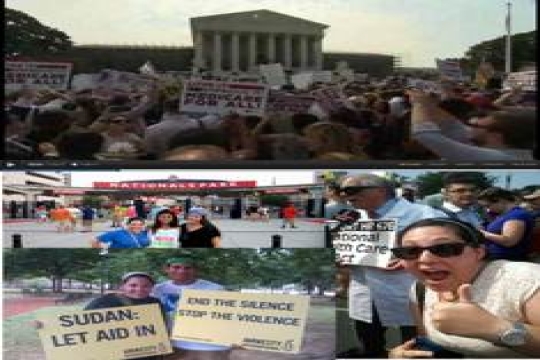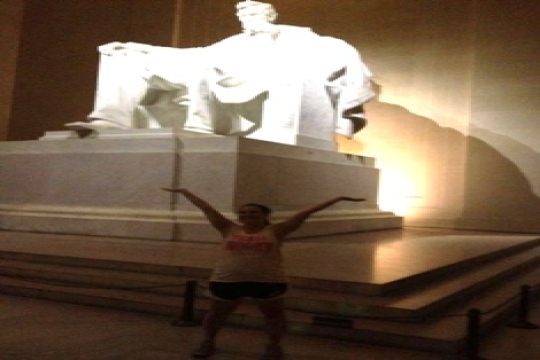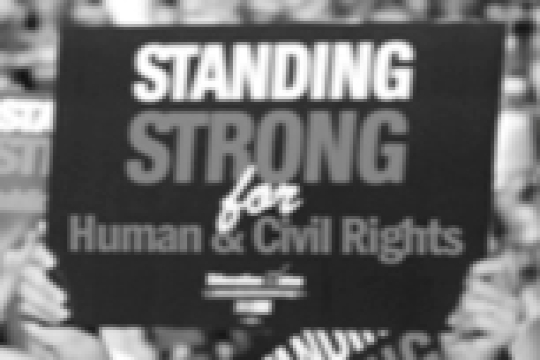"And you shall be holy, for I the lord am Holy" (Leviticus 11:44).
 How often does our work in the social justice field really feel like holy work? Does photocopying really connect you to God's holiness? What about Excel spreadsheets--does that bring you closer to God's presence? Believe me, if it did, we'd all be angels. Everyone knows the stereotypical intern duties and how painstakingly mundane they can be. Tack onto that the frustration of working for a cause about which you may be incredibly passionate, but the people you are trying to connect with just don't get it. So what does this quote from Leviticus tell us about our obligation to be holy, and what kinds of acts bring us closer to this holiness?
How often does our work in the social justice field really feel like holy work? Does photocopying really connect you to God's holiness? What about Excel spreadsheets--does that bring you closer to God's presence? Believe me, if it did, we'd all be angels. Everyone knows the stereotypical intern duties and how painstakingly mundane they can be. Tack onto that the frustration of working for a cause about which you may be incredibly passionate, but the people you are trying to connect with just don't get it. So what does this quote from Leviticus tell us about our obligation to be holy, and what kinds of acts bring us closer to this holiness?
This past summer, our Machon Kaplan interns have truly answered this call to be holy by not only working for causes bigger than themselves, but also by delving deeper into the crossroads of Judaism, social justice work and our tradition's imperative for action against inequality. From their very first days here, and through every workday, class and activity this summer, their contributions (even if it is photocopying or sending out countless emails) have all been insightful, thought-provoking and challenging. The issues laid out in front of them and for which they are advocating are all complicated and fraught with opinions and ideologies, but our interns tackled them with passion, knowing that a well-researched perspective is the one most worth listening to, even in times of disagreement.
The most important lesson that our interns learned this summer is that their voices are vital in the advocacy and public policy process, both as informed American citizens and as Reform Jews. May they continue their involvement and their passion as they move on to the rest of their time in college, and beyond into the dreaded "real world." It has been a true pleasure and an honor to work with these interns this summer and help them navigate the great political system.
So does this imperative for holiness mean we all need to pack our bags and move to D.C. in order to do holy work? Certainly not, but in my extremely humble opinion holiness means understanding your role in society and your connection to every other person on this earth; we're all connected, and the sooner you start understanding how you can help, the sooner you will indeed be following this edict. Shabbat Shalom!
Ariel Naveh is a third-year rabbinical student at Hebrew Union College-Jewish Institute of Religion's Cincinnati campus. He was the program coordinator for this year's Machon Kaplan Summer Social Action Internship Program.
 How often does our work in the social justice field really feel like holy work? Does photocopying really connect you to God's holiness? What about Excel spreadsheets--does that bring you closer to God's presence? Believe me, if it did, we'd all be angels. Everyone knows the stereotypical intern duties and how painstakingly mundane they can be. Tack onto that the frustration of working for a cause about which you may be incredibly passionate, but the people you are trying to connect with just don't get it. So what does this quote from Leviticus tell us about our obligation to be holy, and what kinds of acts bring us closer to this holiness?
How often does our work in the social justice field really feel like holy work? Does photocopying really connect you to God's holiness? What about Excel spreadsheets--does that bring you closer to God's presence? Believe me, if it did, we'd all be angels. Everyone knows the stereotypical intern duties and how painstakingly mundane they can be. Tack onto that the frustration of working for a cause about which you may be incredibly passionate, but the people you are trying to connect with just don't get it. So what does this quote from Leviticus tell us about our obligation to be holy, and what kinds of acts bring us closer to this holiness?
This past summer, our Machon Kaplan interns have truly answered this call to be holy by not only working for causes bigger than themselves, but also by delving deeper into the crossroads of Judaism, social justice work and our tradition's imperative for action against inequality. From their very first days here, and through every workday, class and activity this summer, their contributions (even if it is photocopying or sending out countless emails) have all been insightful, thought-provoking and challenging. The issues laid out in front of them and for which they are advocating are all complicated and fraught with opinions and ideologies, but our interns tackled them with passion, knowing that a well-researched perspective is the one most worth listening to, even in times of disagreement.
The most important lesson that our interns learned this summer is that their voices are vital in the advocacy and public policy process, both as informed American citizens and as Reform Jews. May they continue their involvement and their passion as they move on to the rest of their time in college, and beyond into the dreaded "real world." It has been a true pleasure and an honor to work with these interns this summer and help them navigate the great political system.
So does this imperative for holiness mean we all need to pack our bags and move to D.C. in order to do holy work? Certainly not, but in my extremely humble opinion holiness means understanding your role in society and your connection to every other person on this earth; we're all connected, and the sooner you start understanding how you can help, the sooner you will indeed be following this edict. Shabbat Shalom!
Ariel Naveh is a third-year rabbinical student at Hebrew Union College-Jewish Institute of Religion's Cincinnati campus. He was the program coordinator for this year's Machon Kaplan Summer Social Action Internship Program.
Related Posts
Image:

From the White House to the RAC: Two Summers in Washington DC
There isn’t anything quite like summertime in DC. Young adults flock to the nation’s capital for a once in a lifetime living and working experience. But for me, I’m fortunate enough to have a second ‘once in a lifetime’ opportunity. Last summer as a rising sophomore, I was one of the youngest
Image:

From YOLO to FOMO in our Nation’s Capital
YOLO- You Only Live Once- has rapidly grown into a trendy motto that encourages daring and reckless behavior amongst today’s youth. When I flew across the country to Washington, D.C. this summer, I committed the impulsive and spontaneous concept of YOLO to my mind. By the end of my second afternoon
Image:

Teachers are Social Justice Fighters
Photo courtesy of the NEA. On Thursday, June 28, as part of my internship with the National Education Association, I had the opportunity to attend the Joint Conference on Concerns of Women and Minorities. Every year, the Joint Conference provides a forum for teachers who are active on social justice